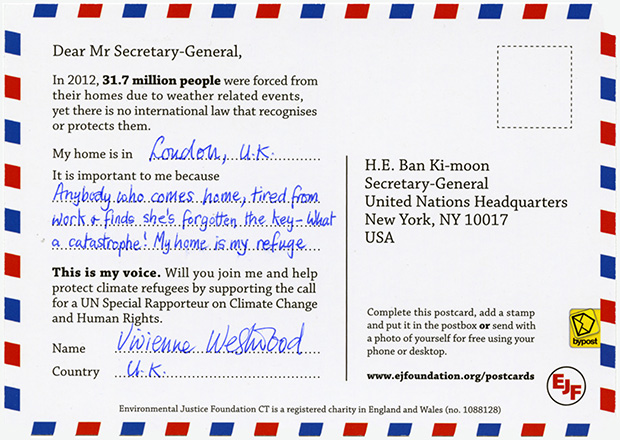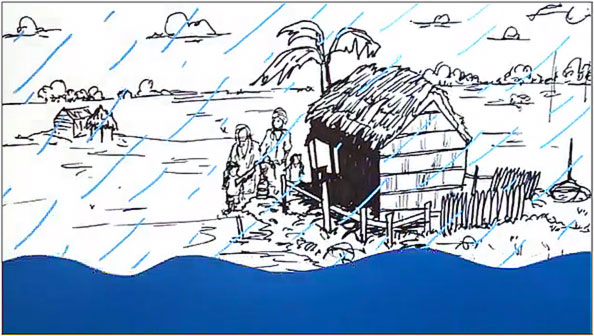No Place Like Home – guest blog by Steve Trent
Everything is connected and Climate Revolution is connected with many NGO’s, charities, organizations and friends who share our beliefs and concerns for the planet:
Environmental Justice Foundation (EJF), Greenpeace, Cool Earth, Friends of the Earth (FoE), RSPB, Peta, New Economics Foundation (nef), Frack Off, Reclaim the Power, ClientEarth, Gaia Foundation, Lush, 350.org, Trillion Fund
We plan to tell you a bit about our work with each of them and will focus on them individually over the coming months. We’ll also feature guest blogs to bring you up to date on their thoughts and latest activities.
You can help. Get involved.
Today we start with EJF , a charitable trust working internationally to protect the planet and human rights. We started working with them nearly two years ago on their ‘No Place Like Home’ campaign highlighting the urgent need for environmental security and the recognition of the plight and the protection of climate refugees worldwide.
We began our collaboration when Vivienne designed a t-shirt for this campaign photo of Naomi in War/peace t-shirt and you can help support them by buying one!
EJF’s latest campaign, ‘Postcards from the Frontline’, takes the pictures and stories of climate witnesses and their supporters straight from their phones and desktops to the United Nations, the foremost forum to address issues that transcend national boundaries. The postcards reaching UN Secretary-General Ban Ki-Moon are symbolic of a global call to recognise, protect and assist those on the frontlines of climate change.
Working with Lily Cole, we used our fashion show in London this September to draw even more attention to the postcards – Lily opened the show with her dance, ’The Red Shoes’, a metaphor for climate refugees who must escape their hostile environment. Photo of Lily dancing.
In 2012, 31.7 million people were forced from their homes due to weather related events, the equivalent of more than half the UK population displaced in one year. Although climate refugees are far greater in number than those fleeing conflict, they are not recognised by any international law. EJF is working to change this. We all need to help them by sending our postcards to Ban Ki-Moon by 10 December. See how we helped and how you can help!

Lily wrote “Planet earth is our home”
Andreas said “There’s no freedom without home”
No Place Like Home – guest blog by Steve Trent, Executive Director at the Environmental Justice Foundation (EJF)
 As an international community, our collective failures on climate change are having critical consequences. Today climate change has become one of the major challenges to the basic human rights to life, food, health, water, housing and self-determination.
As an international community, our collective failures on climate change are having critical consequences. Today climate change has become one of the major challenges to the basic human rights to life, food, health, water, housing and self-determination.
Philosopher Simone Weil said that, “to be rooted is perhaps the most important and least recognized need of the human soul”. Take a moment to consider your roots and the place you call home. I suspect that, like me, your home represents a lot more to you than just the bricks and mortar of your house. Rather the place we identify as home probably has more to do with culture and background, friends and family, livelihood and daily habits and the landscape in which each of us live.
Whether from London or Beijing, rural Bangladesh or one of the many small Island states like Fiji, your sense of identity is fundamentally tied to all these things. In most cultures this connection is palpable. There is a beautiful example in the Fijian language – the word Vanua. This is often (mis)translated into English as ‘land’, but its real meaning is, ‘land, people and custom’, it relates to the intimate connection between the landscape, culture and sense of identity.
What does it mean then to be deprived of your roots and home? Losing the security of the place where you sleep can be devastating. Being forced from the place we call home – the place you were born, where your family, friends, habits and culture reside by circumstances over which you have no control and had no part in creating.
This must corrode the soul.
And it is exactly this kind of forced migration that is now emerging on a massive global scale, with millions, mainly among our planet’s poorest and most vulnerable, being forced to move. These are the new refugees, “climate refugees” driven from their homes by changes in climate, the primary result of the developed world’s inability or refusal to understand the impacts of its development on the global environment and on others far less fortunate.
The hard lesson is that our lifestyle choices have tangible impacts on others. Nothing demonstrates this better than the impacts of climate change. Our industrialization, development and consumerism have a price – but we in the developed world are not paying it. Instead, some of the world’s poorest countries are being made more vulnerable.
Rising temperatures, erratic rainfall, increased drought and desertification and more intense flooding and storms have a real human impact. There are large parts of the world where life is getting harder: faced with either too much water and floods, or too little water and nothing to drink, or occasionally both. Experiencing food insecurity, declining health and even the direct threats to their lives from extreme conditions or the conflicts that are blossoming in climate chaos – witness the violence of Darfur or slow tragedy being played out in the Dadaab refugee camp in Kenya where nearly half a million people barely survive. Faced with drought, the loss of their precious livestock and famine these people had no choice but to move.
Millions of people are displaced in this way each year, and their numbers are on the rise.
I believe that environmental security is a human right. Climate change will drive hundreds of millions of people from their homes as this century progresses. How will we explain to these people that we were unprepared to make changes to how we live in order to save their homes, to save their livelihoods, their land and their identity? What kind of future will these people have? Where will they go? And how much responsibility will we take?
It is clear we are not doing enough to protect and assist climate refugees. Climate change is among the greatest threats to our collective rights, and in particular to the rights of the poor, the weak and the vulnerable. The international community has the power to recognise, support and protect the world’s growing number of climate refugees, and we must all do what we can individually to ensure they act now.






No comments yet